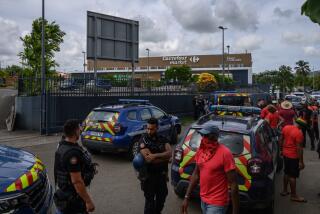France Imposes a State of Emergency to Quell Riots
- Share via
PARIS — The French government declared a state of emergency Tuesday, enabling police to impose curfews and other extraordinary measures to combat the worst riots in recent history.
President Jacques Chirac’s Cabinet decided at a special meeting to invoke an emergency powers law first imposed during the Algerian war of independence against France 50 years ago. Starting at midnight, the authorities had the right to declare curfews in targeted areas, restrict the movement of people and vehicles, request police searches and place suspects under house arrest.
“For a period of 12 days, searches will be possible every time we suspect possession of weapons,” said beleaguered Interior Minister Nicolas Sarkozy, who is leading the attempt to restore order. He said the measure would help “systematically apprehend troublemakers and systematically prevent a spread of violence.”
Although arson attacks and street clashes continued Tuesday night in cities such as Toulouse and Lille, the violence appeared to abate nationwide on its 13th day, authorities said. The number of communities hit by disturbances declined from 300 to 226, said Michel Gaudin, the director of the national police. The number of vehicles burned overnight dropped by 235, for a total of 1,173, he said.
Weary police chiefs have by no means declared victory, but the tide appears to be turning against rampages, which have lost intensity in the region around the capital.
After the unrest broke out last month in the tough immigrant suburbs north of Paris, the riots spread gradually across the provinces as youth gangs sought to imitate the mayhem on their television screens, said a police commander based in Lyon, the nation’s second-biggest city. He predicted calm would soon return to his area in south-central France.
“I think that in a few days it will be under control,” said the commander, who asked to remain anonymous for security reasons. “We have had problems here -- cars, schools, buses burned. But not that many direct attacks on police.
“The youths are in competition with other neighborhoods and cities. It’s like a game,” he added. “They are imitating what they see on television.”
Still, police and intelligence officials worry that anger in the riot zones will smolder for a long time, susceptible to flare-ups.
The commander and others predicted that the new emergency powers would be used in a focused manner. Chirac’s decision was not taken lightly in this country, which gives its security forces great power but values its traditions of liberty and human rights.
Passed in 1955 during the war that led to Algeria’s independence from France, the law implemented Tuesday was applied first in Algeria and then in France in 1958 to suppress conflict connected to the fighting in the colony. Since then, the government has exercised emergency powers only once: not in France, but in the French-run territory of New Caledonia two decades ago.
Nonetheless, leaders of the center-right government said Tuesday that the time had come for an extraordinary response.
“It is necessary to accelerate the return to calm,” Chirac said.
The Socialist Party, the largest opposition force, expressed support for the move during debate in the National Assembly on Tuesday, as did far-right parties. On the far left, the smaller Green and Communist parties condemned the state of emergency as a “provocation.” Their leaders say it raises bad memories of the struggle in Algeria because many rioters are of North African descent.
“This state of emergency ... treats these children and grandchildren of immigrants as the indigents of the republic,” said Green Party leader Noel Mamere, saying he would refuse to impose emergency powers in Begles, the town near Bordeaux where he is mayor.
During a speech to legislators, Prime Minister Dominique de Villepin promised the law would be implemented carefully. He also acknowledged that the violence had revealed the profound difficulties experienced by the state in assimilating the descendants of immigrants from colonies in North and sub-Saharan Africa who, as De Villepin admitted, often faced discrimination and deprivation.
“The effectiveness of our model of integration is in question,” De Villepin said. “France is wounded. It cannot recognize itself in its streets and devastated areas, in these outbursts of hatred and violence.”
He said the state of emergency would not restrict the media, which have wrestled with the dilemma of covering the unrest aggressively without encouraging its spread.
On Tuesday night, the city of Amiens in northern France declared a curfew banning juveniles from the streets between midnight and 6 a.m. Several other towns imposed curfews as well.
The police commander in Lyon said the curfew powers would be useful mainly against focal points of violence, such as housing projects that were bastions of youth gangs.
“A curfew is not an easy thing to enforce in an entire city,” the commander said. “We need to be parsimonious about it. It gives us the power to identify certain trouble spots and really shut them down.”
More to Read
Sign up for Essential California
The most important California stories and recommendations in your inbox every morning.
You may occasionally receive promotional content from the Los Angeles Times.










